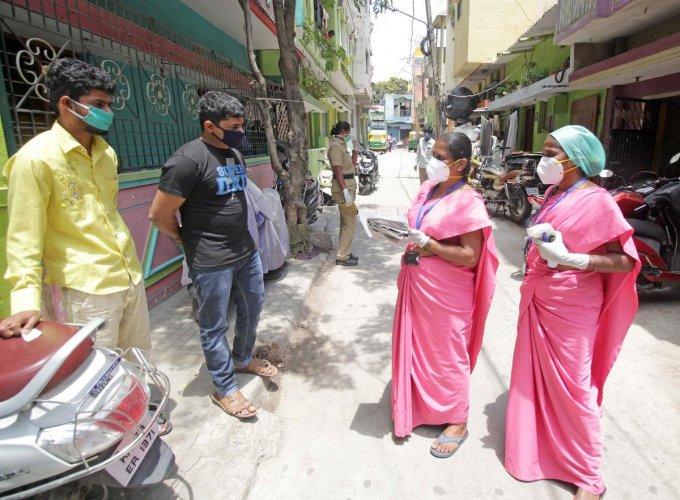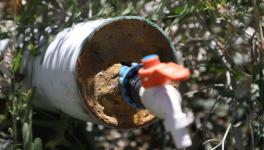J&K: Unpaid and Unprotected, ASHA Workers Struggle at the COVID-19 Front-lines

Representational Image. Image Courtesy: PTI
For the last six months, Mamata Devi (name changed), a 50-year-old ASHA worker has been going door-to-door in Bishnoi block, Jammu, checking families for COVID-19 symptoms. With a dupatta (long scarf) covering her head and a mask she made on her own, she updates a register with her glove-clad hands while advising families on how to keep safe. In case she encounters anyone with symptoms, she takes them to the nearest health facility.
Mamata, an Accredited Social Health Activist (ASHA), says that her job responsibilities have changed since the pandemic struck. She has to cover 20 families on a daily basis during her surveys. In addition, she also provides other essential services to rural households, ranging from safe deliveries, child vaccinations to making essential provisions like ORS, condoms and medicines available to them.
However, after meeting her targets, Mamata grapples with trying to make both ends meet. She says that she has not been paid since June.
According to her, she was supposed to receive a paltry amount of Rs 2,000 per month with an additional Rs 1,000 as an incentive for the COVID-19 surveys. “Arranging food for the family has become a task. It was already difficult to survive on 2,000 rupees and we are not even getting that now,” she said.
Since the outbreak of COVID-19 in India, ASHA workers have had to take on more responsibility. According to Ministry of Health and Family Welfare’s Model Micro Plan for Containing Local Transmission of Coronavirus Disease (COVID-19), ASHA workers have been assigned to monitor the situation locally in order to control the spread of the infection.
With little to no remittance, which is not enough even to feed their families, these women are employed to conduct daily visits to houses, report symptomatic cases, identify contacts of confirmed and suspected cases, monitor contacts daily, create awareness among the community and counsel families regarding disease prevention and the like.
Mamata says that she has no money for her treatment in case she ends up being infected herself.
Usha Devi (name changed), another ASHA worker, took on the job after her husband died from a cardiac arrest in 2011. She says that she took up the job after her husband passed, but that she was equally driven by the passion to contribute to providing health-related facilities to villagers. Hence, she chose to be an ASHA worker and has been serving in Akhnoor Block, Jammu since then. However, Usha’s passion has dimmed over the years. Unable to fend for her family, Usha did odd jobs like cleaning and washing clothes, which, she says, have also disappeared since the pandemic struck.
“I was pushing my son into mazdoori but given the pandemic even that option is gone. I am surviving on debt,” she said. Usha does not like to call herself a health activist but a worker. “We put more work in than most workers yet we are called activists. We are workers and we want the same rights as them,” she said.
ASHA workers and community health workers have been at the forefront of the COVID-19 battle, ensuring the safety of others at a great risk to their lives. The workers lamented that they had no access to masks, gloves, PPE kits and sanitisers. Anu Devi (name changed) says that they were initially given four masks and two small bottles of hand-sanitisers but that they they ran out of sanitisers and the masks were torn in a matter of weeks.
“Now we use our pallus and masks made at home from old clothes. We work in a situation where there is a high chance of contracting the infection yet safety gear has not been made accessible to us. This is brutal,” she says.
ASHA workers across Jammu and Kashmir have played a huge role in strengthening primary health care by making it to accessible for disadvantaged and disempowered families, and implementing government schemes on the ground. However, they feel that their work and efforts have been long overlooked.
With delayed salaries and a lack of protective gear, the ASHA workers have been demanding their dues in the form of a minimum wage of Rs 21,000, PPE kits, regularisation of their services, free COVID-19 tests, Rs five lakh compensation to those infected on duty and medical insurance for their family members.
In Kashmir, ASHA workers have expressed similar concerns. Dilshana (name changed), who works in Anantnag district of South Kashmir, says that around 12 of her colleagues have contracted the infection.
“We are risking our lives for the greater cause without masks and money, but the government has turned a blind eye towards us. They should provide us with safety gear,” she said.
Sham Prasad, secretary of the CPI (M), told NewsClick: “I have worked closely with the workers. Their demands are genuine. They are the backbone of the rural health system and are playing an extraordinary role in controlling the COVID-19 situation on the ground level. The apathetic attitude of the government is appalling.”
Get the latest reports & analysis with people's perspective on Protests, movements & deep analytical videos, discussions of the current affairs in your Telegram app. Subscribe to NewsClick's Telegram channel & get Real-Time updates on stories, as they get published on our website.
























